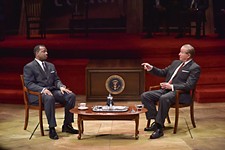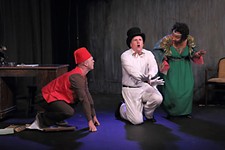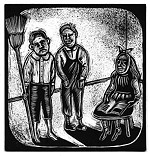Othello: Brought Low by the Patriarchy
Local Arts Reviews
Reviewed by Ada Calhoun, Fri., Jan. 21, 2000
Othello: Brought Low by the Patriarchy
The Off Center,
through January 22
Running Time: 3 hrs
Luna Mama Productions has taken William Shakespeare's tragedy of the dark general Othello, whose love for the pale Desdemona is undermined by the devious soldier Iago, and created a lesbian adaptation whose mission is the "war against the general enemy, inequality." Othello is played by a woman and the word Moor is, according to the program, "reloaded" by replacing it with "lesbian." Much of the cast is gender-bent (beards on girls, drag queens, etc.), though Iago is played as the conniving man-monster (Mr. Ripley prototype) he's always been. As directed by Sarah Kennedy, this production no longer targets the "green-eyed monster" jealousy as the arch-enemy; instead, our "cunt-fearing society" is the true evil, with a burden of responsibility on choice "crusaders" to right societal wrongs. Through the story of Othello, which has at its roots the 400-year-old scandal of a pure white girl and a mysterious black Moor, Kennedy and company tell the story as a lesbian affair brought down by patriarchal standards of purity and honor.
For a while, it works. In the first act, when Desdemona's father (who's played by a woman) accuses the Moor of "corrupting" his daughter, there's some hint of a parallel societal bias between homophobia and racism. And when Sarah Chain (Othello) steps out of the trial scene to deliver a charming aside about falling in love with a girl -- how it was all the clouds' fault for being so nice -- the conceptual threads seem like they're all going to come together.
In the second act, however, things get murky, and the relevance of the asides becomes less clear. The gist of these is that whores are good; there was once a golden era of matriarchy and temple prostitutes; and back then, we women knew about our bodies. These points are made in a painfully distracting fashion, as when one of the chorus members interrupts an emotionally charged scene (in which Desdemona is being wrongly accused of being a whore) with a lecture about whores being revered in ancient times. While it's pretty easy to make a case for ours being a "cunt-fearing society," and one burdened by homophobia, racism, and classism, the connection to Othello never really gels.
Production-wise, chaos lurks, too. The set is peppered with members of a modern/experimental dance chorus -- a kind of star-crossed union between mime and "Sprockets." They stand stock still behind the actors, staring straight ahead, occasionally moving one leg out from behind them and putting a finger over their lips, or moving their hands over their bodies to form a "v" at crotch-level. Most of these moves are made slowly, but sometimes there are sudden fast gestures, like a move best described as "the noose-tug." The choreography is so distracting that the troupe might as well be making faces and wiggling their fingers, thumbs in ears. This proves especially obnoxious during what would be powerful scenes, excellently acted, particularly those involving the versatile and delightful Chain as Othello and the engaging Jenn Allard as Cassio. Iago is played effectively by Ethan Perry as an eye-rolling, leering jerk.
In fact, most of the actors pull off the dialogue of the original play with aplomb, and the lesbian adaptation itself is by and large solid. It's the other additions that muddle things to the point of extreme confusion. The problems here -- common to many plays in this the land of slack -- are pitifully little editing (this show clocks in at close to three hours) and a mess of ideas, some promising, that have not been corralled into a cohesive vision. The skill of several performers and the presence of all-too-often absent lesbian themes (and love scenes) are great, but the length, convoluted message, and friendly-fire distractions make what might have been a tragedy about doomed love between two women into almost a parody of itself -- never adding up to either a steady production or a clear political statement.










